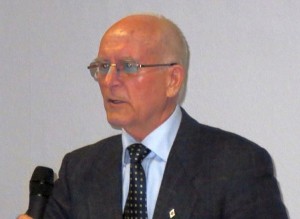Reacting to Ukraine crisis, Generals in Germany say ‘No’ to war with Russia
This article by Peter Wolter was published in the German daily Junge Welt on May 6. The translation is by Workers World managing editor John Catalinotto. The German Democratic Republic — East Germany — existed as a socialist state of 17 million people, allied to the Soviet Union, before its annexation by imperialist Federal Germany in 1990.
Approximately 100 generals of the National People’s Army (NVA) of the German Democratic Republic, which was disbanded 25 years ago, have reacted to the Ukraine crisis with a peace appeal to the general public. The appeal’s immediate impulse is the celebration of the 70th anniversary of liberation from German fascism [that ended World War II in Europe on May 9, 1945]. Among the signatories are two former defense ministers, three highest level generals, 19 lieutenant generals and 61 major generals, and several admirals.
“The majority of the signatories have witnessed the Second World War at the front,” former East German Defense Minister Theodor Hoffmann said May 5 in Berlin at the presentation of the call made by “Soldiers for Peace.” “We military officers know very well that war must not be an instrument of politics; based on our experience we can accurately evaluate the consequences for all of Europe.”
The military strength of the Warsaw Pact helped to ensure that the Cold War would not become a hot one. Since the dissolution of the alliance, however, the West has increasingly adopted military force as an instrument of policy — examples are the various wars against Iraq, in the Balkans, in Afghanistan, Libya and elsewhere.
“In one form or another, the German Bundeswehr [Armed Forces] has been involved in all these wars,” said Hoffmann, whose last held rank was admiral. “It has taken on reconnaissance tasks, exchanged information and even helped in the air refueling of fighter aircraft.” This is contrary to the agreement that the former Chancellor Helmut Kohl made with the former East German state and party leader, Erich Honecker, that war must never be launched from German soil.
Led by the United States, NATO countries are now reverting to Cold War policies and have justified this turn by accusing Russia of aggression, Hoffmann said. Most signatories to the appeal have had quite different experiences with this country, however, and many have also studied there. “Experience teaches us that it is better to have the Russians as friends and not as enemies.” Also, the most important problems of today could be solved only in collaboration with Russia.
The call will be delivered not only to all members of the German parliament, but also to the most important embassies, including those of NATO countries. The text has already been delivered in the Russian language for the occasion of a ceremony in Moscow [by] members of the former Soviet Army, and on May 9 it is to be presented in Prague, Czech Republic, to a public rally. The initiators of the appeal and many of its signatories want to lay wreaths on that date at the monuments to fallen Soviet soldiers in Berlin-Treptow and Berlin-Tiergarten.
The signers welcomed the call of the Christian Democratic Union politician Willi Wimmer. “As the spearhead of the armed forces of the Warsaw Pact, the members of the National People’s Army are among those who can assess the consequences of a military confrontation in Europe and therefore in Germany,” the former parliamentary state secretary in the Federal Ministry of Defense said in a statement. “It distinguishes the authors, that they could significantly address the historical development and its resulting obligation. … That misery that had been caused by two world wars continues until today in Europe and requires all nations and states to adhere to good neighborly relations and peaceful trade.”


